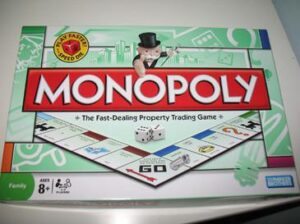This is Faith in Play #13: The Evils of Monopoly®, for December 2018.
It is perhaps almost a joke, that whenever uninformed people begin talking about the evils of role playing games a gamer will respond with the notion of the evils of the game Monopoly®. I mentioned it myself in my 1997 article Confessions of a Dungeons & Dragons™ Addict. (I do not know whether anyone else had mentioned it before me, and it was one of several games I cited in that article for various issues.) Lately, though, the idea has nagged at me that there are numerous “dangers” in Monopoly® in particular, and it would be worth taking a moment to address the game.

Let’s begin with the one that is the most obvious: the game promotes a mindset of greed. To win the game you must become the “richest” player, accruing the most money and real estate of anyone in the game. It is capitalism on steroids.
Sure, there are wealthy Christians in the world, and not all of them handle their wealth admirably. Yet most of us would agree that the pursuit of money is not only wrong, it is a very alluring trap. Learning as Paul to be content in luxury or poverty is not an easy lesson. Monopoly teaches the opposite lesson, encouraging us to seek to be the wealthiest.
Yet the objection goes deeper. There are plenty of games in which being the best is the way to win, and quite a few in which the score is given with dollar signs in front of it. If it were only that you had to try to be better than everyone else at the table, well, a lot of games are like that, and Monopoly® might be excused. However, unlike Parchessi or Life or many other games in which once one person wins everyone else loses, the rules of Monopoly® state that nobody wins until everyone else loses. That is, in order to win the game you have to drive all the other players into bankruptcy. You don’t win until you are the last man standing, financially. We can accept that in a footrace once one person wins, everyone else loses. This is more like a demolition derby, in which once everyone else loses, the one player remaining wins.
So those are perhaps the big objections to the game; but it would be a short and perhaps laughable article if those were the only problems. The game also offers its “Chance” and “Community Chest” cards, and in doing so creates another notion to which Christians ought to object: the idea that favorable and unfavorable events come to people at random. You might win a beauty pageant, or have to go to jail, but it has nothing to do with anything you did, it is merely the roll of the dice and the draw of the cards that controls your fate. As we discussed long ago in Faith and Gaming: Mechanics, randomness is a theological problem wherever we encounter it. Monopoly® does not suppose that God is behind these random distributions of good and ill; it teaches that such outcomes are random.
It also teaches that such random events are to some degree balanced. A chance card can be benefit or bane, and the balance between them is such that you do not know whether to dread or anticipate as you reach for one. God’s world is good; evil is found in it, and suffering, and this article is not about to resolve the issues involved in that. However, a game that teaches us that good and evil balance out in the end is not a Christian game. Good wins in the end, and there is more good than evil in our path, because God gives good gifts. If we come away from a game thinking that the good and the bad balance each other in the end in life, we have learned the wrong lesson. The truth is, much that we think bad is for our good, and thus is itself good, and the good in our lives outweighs the bad.
Let’s add one more issue to the pot: if you pass “Go” you collect, in the original version, two hundred dollars. That is, if you can survive long enough, the next paycheck will come and you’ll have money. For many people that’s realistic, but it’s also teaching a lesson, that all you have to do is survive to the next paycheck. Most of us make the mistake of thinking that our money comes from our hard work at our jobs; the fact is, our money comes from the grace of God–the jobs are only the vehicle by which it is delivered. James warns us against relying on what will come tomorrow; Monopoly® encourages us to expect it.
I am not going to say not to play Monopoly®. As board games go, it’s well designed and popular. I am going to say to be wary of the lessons it teaches, and remind yourself of the truth.
Or find a more Christian game to play.
Previous article: Fiction and Lies.
Next article: Wickedness.
